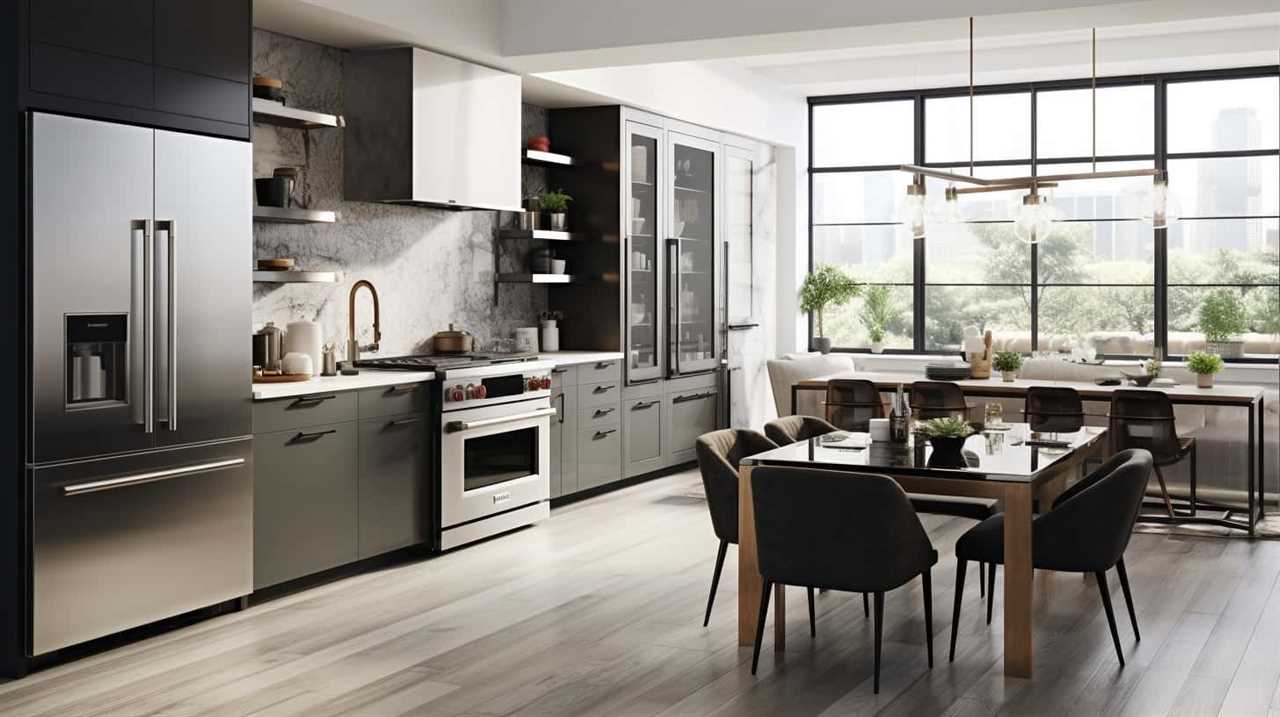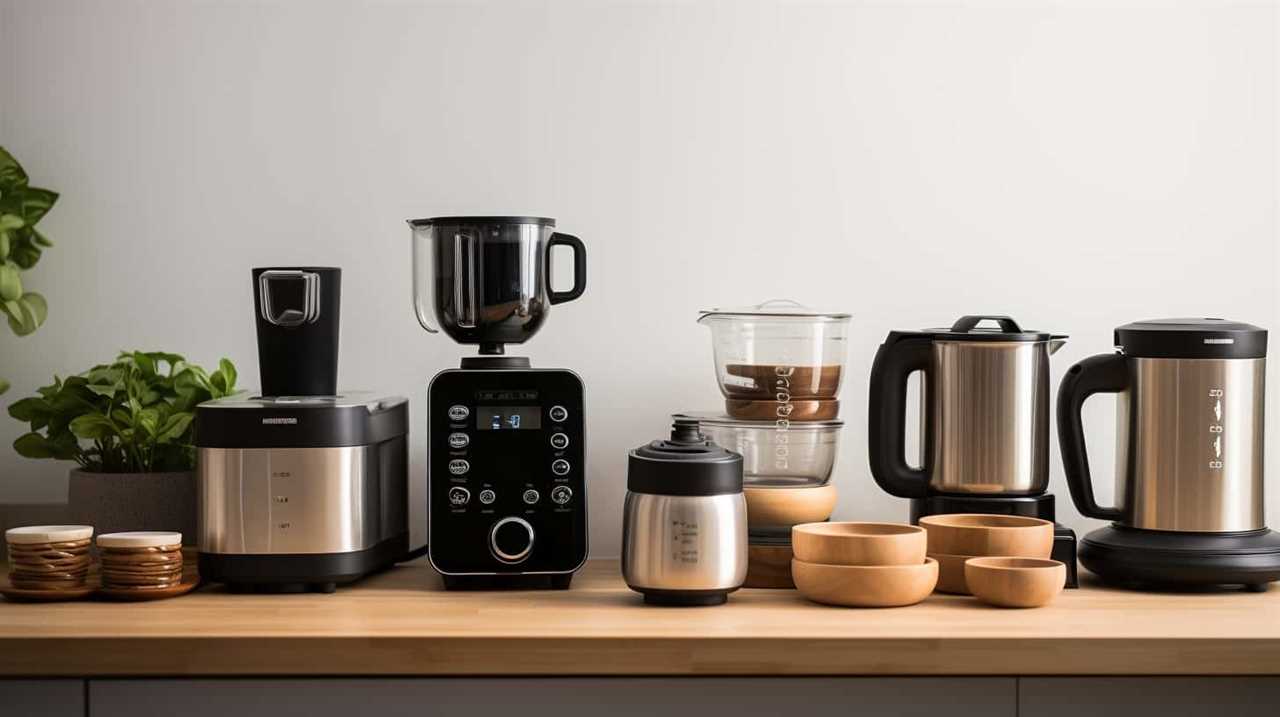Curious whether old appliances use more electricity? Look no further – we have the answers you seek.
In this article, we’ll delve into the topic and provide you with a comprehensive analysis. From understanding power consumption in older models to comparing energy consumption between old and new appliances, we’ll explore the factors that affect energy usage.
So, if you’re aiming for mastery in energy conservation, keep reading to discover valuable insights and tips for reducing energy usage in your old appliances.
Key Takeaways
- Older appliances tend to use more electricity due to outdated technology and lack of energy-saving features.
- Regular maintenance and proper usage can help mitigate the impact of age on energy consumption.
- Newer appliances meet stricter energy efficiency standards, reducing carbon footprint.
- Upgrading to newer, more energy-efficient appliances can lead to significant energy savings over time.
Age of Appliances and Energy Consumption
When it comes to the energy consumption of appliances, the age of the appliance plays a significant role in determining its efficiency. Older appliances tend to use more electricity due to outdated technology and lack of energy-saving features.

Upgrading to newer, more energy-efficient models can lead to substantial energy savings. By replacing old appliances with newer ones, households can benefit from reduced energy consumption and lower electricity bills. Energy-saving tips such as choosing appliances with the Energy Star label, which indicates high energy efficiency, can further enhance the benefits of upgrading.
Additionally, newer appliances are designed to meet stricter energy efficiency standards, resulting in a reduced carbon footprint and a positive impact on the environment.
Now, let’s delve into the importance of energy efficiency ratings and their relationship with old appliances.
Energy Efficiency Ratings and Old Appliances
When considering energy efficiency ratings and old appliances, it’s important to understand that:

- Older appliances typically have lower efficiency ratings compared to newer models.
- This means that they consume more energy to perform the same tasks.
By upgrading to newer, more energy-efficient appliances, homeowners can:
- Significantly reduce their energy consumption.
- Lower their electricity bills.
Efficiency of Old Appliances
Old appliances with low energy efficiency ratings consume significantly more electricity than their modern counterparts. When appliances age, their energy efficiency tends to decrease due to wear and tear, outdated technology, and the lack of energy-saving features. This means that older appliances require more electricity to perform the same tasks as newer, more efficient models.
To save energy and reduce electricity consumption, it’s recommended to replace old appliances with newer, more energy-efficient options. Energy-saving tips include looking for appliances with high energy efficiency ratings, such as those labeled with the Energy Star certification. Additionally, selecting appliances that have features like programmable timers, power management modes, and energy-saving settings can further reduce energy consumption.
Transitioning into the next section, it’s important to understand how energy consumption of old appliances compares to new ones.

Energy Consumption Comparison
To compare the energy consumption of old appliances with modern ones, we can look at their energy efficiency ratings and how they impact electricity usage. Age plays a significant role in energy efficiency, with older appliances generally consuming more electricity.
Here are three key factors to consider when comparing the energy consumption of old and new appliances:
- Energy Efficiency Ratings: Modern appliances come with energy efficiency ratings that indicate how efficiently they use electricity. Higher ratings mean lower energy consumption and lower monthly bills.
- Technological Advancements: New appliances often incorporate advanced technologies that enhance energy efficiency. Features like smart sensors and programmable settings optimize energy usage, reducing overall consumption.
- Energy-Saving Features: Old appliances lack energy-saving features, such as automatic shut-off or sleep mode. These features help reduce energy consumption when appliances aren’t in use, further contributing to lower electricity bills.
Considering the impact of energy consumption on monthly bills, investing in new, energy-efficient appliances can lead to significant savings over time.
Understanding Power Consumption in Older Models
Our research shows that older appliances generally consume a significantly higher amount of electricity compared to newer models. This is mainly due to the advancements in technology and energy efficiency standards in recent years. As appliances age, their power efficiency tends to decrease, resulting in higher electricity consumption. It’s important for consumers to be aware of this and take steps to reduce energy usage.

To minimize electricity consumption, here are some energy-saving tips for older appliances. Firstly, consider replacing older appliances with newer, more energy-efficient models. Look for appliances with Energy Star ratings, as they’re designed to consume less electricity.
Additionally, regular maintenance and cleaning can improve the efficiency of older appliances. For example, cleaning the condenser coils of refrigerators and air conditioners can help them run more efficiently and use less electricity.
Factors Affecting Energy Usage in Old Appliances
When it comes to energy usage in old appliances, there are several factors that play a crucial role.
Firstly, the age and efficiency of the appliance can greatly impact its energy consumption. Older models tend to be less energy-efficient, resulting in higher electricity usage.
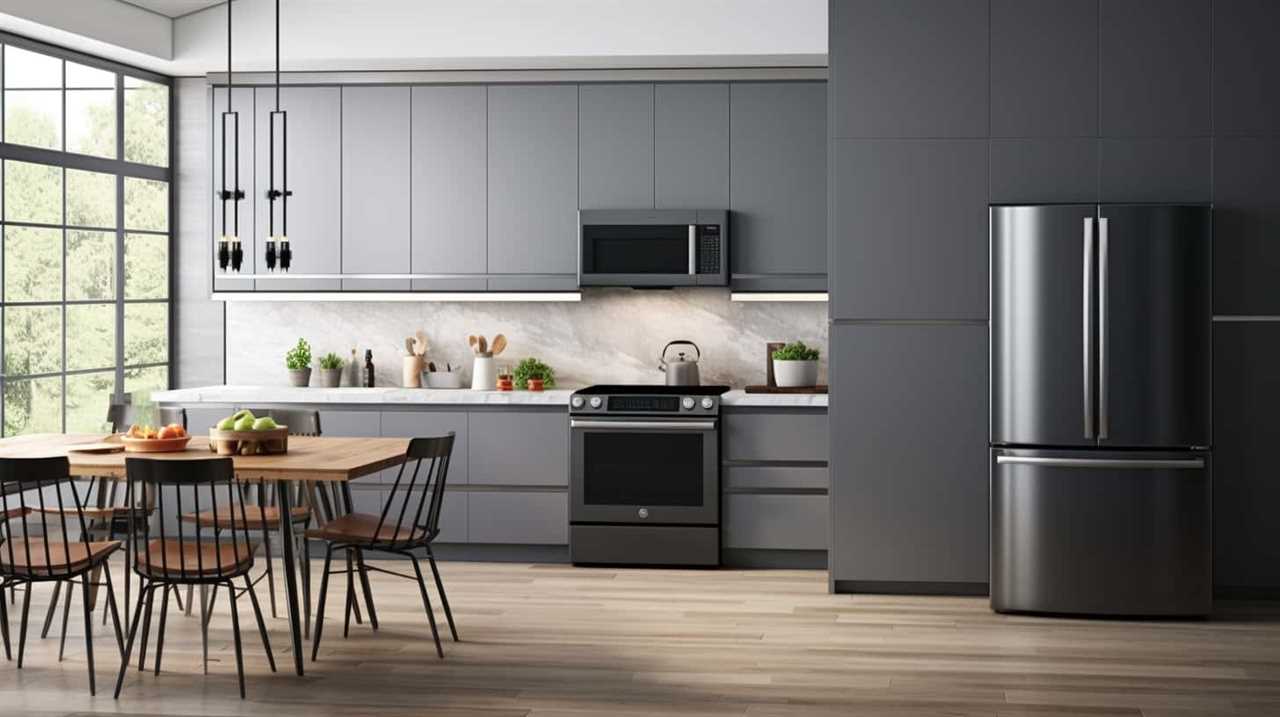
Secondly, the maintenance of the appliance also affects its energy efficiency. Regular maintenance, such as cleaning and replacing worn-out parts, can help optimize energy usage.
Therefore, understanding these factors is essential in determining the energy consumption of old appliances.
Age and Efficiency
In assessing the energy usage of old appliances, we must consider the impact of age and efficiency.
Age plays a significant role in electricity usage, as older appliances tend to consume more energy compared to newer models. This is due to advancements in technology and energy efficiency standards that have been implemented over the years.

When appliances age, their components can become less efficient, leading to increased energy consumption. Additionally, older appliances may not meet current energy efficiency standards, resulting in higher electricity usage.
It’s important to note that regular maintenance and proper usage can help mitigate the impact of age on energy consumption.
Factors affecting age and electricity usage in old appliances include:
- Technological advancements in energy efficiency
- Wear and tear of components over time
- Compliance with current energy efficiency standards
Maintenance and Energy Consumption
To understand the factors that affect energy usage in old appliances, we must consider the importance of regular maintenance. Proper maintenance plays a crucial role in keeping the energy consumption of old appliances in check. Neglecting maintenance can lead to inefficient operation and increased energy usage. By following a maintenance checklist and implementing energy-saving tips, you can optimize the performance of your old appliances while reducing their energy consumption.

Below is a maintenance checklist that can help you ensure the efficient operation of your old appliances:
| Appliance | Maintenance Tips |
|---|---|
| Refrigerator | Clean the coils, check door seals, and adjust temperature. |
| Washing Machine | Clean the lint filter, check water hoses, and level the machine. |
| Air Conditioner | Clean or replace filters regularly and check for leaks. |
| Oven | Clean the oven regularly and check the door seal. |
Comparing Energy Consumption: Old Vs. New Appliances
As we compare energy consumption between old and new appliances, it’s evident that newer models are more efficient. When it comes to age vs. energy efficiency, newer appliances have been designed with advanced technology and energy-saving features that reduce their power consumption. This is in stark contrast to older appliances, which weren’t built with the same level of energy efficiency in mind.
Upgrading to newer appliances can result in significant energy savings and lower electricity bills in the long run. However, it’s important to consider the cost of upgrading appliances. While newer models may be more energy efficient, the initial investment can be higher. It’s crucial for consumers to weigh the long-term energy savings against the upfront cost of purchasing and installing new appliances.
The Impact of Technological Advancements on Energy Efficiency
When discussing the impact of technological advancements on energy efficiency, we can see that newer appliances have greatly benefited from these advancements. Over the years, there have been significant improvements in the energy efficiency of appliances due to advancements in technology. These advancements have led to a reduction in energy consumption, resulting in lower electricity bills and a positive impact on the environment.

Newer appliances now feature energy-saving modes, better insulation, and more efficient components. For example, refrigerators are now designed with improved insulation materials and compressors that consume less energy. Similarly, washing machines have advanced features such as sensor technology and adjustable water levels, which contribute to energy efficiency improvement.
These technological advancements have revolutionized the energy efficiency of appliances, making them more environmentally friendly and cost-effective. As we move forward, it’s essential to explore ways to improve the energy efficiency of old appliances and reduce their energy consumption.
Tips for Reducing Energy Usage in Old Appliances
We can reduce energy usage in old appliances by implementing simple tips and adjustments. Here are three energy-saving tips that can help reduce energy bills and maximize the efficiency of old appliances:
- Optimize settings: Adjust the temperature settings of refrigerators, freezers, and air conditioners to the most energy-efficient levels. Lower the temperature of water heaters to reduce energy consumption.
- Improve insulation: Enhance the insulation around refrigerators and freezers to prevent warm air from entering. Ensure that the seals on doors and windows are tight to avoid energy leakage.
- Practice efficient usage: Avoid overloading washing machines and dishwashers, as it can strain the appliance and increase energy usage. Use the ‘energy-saving’ mode on appliances whenever possible.
Upgrading Vs. Repairing: Which Is More Cost-Effective
To determine whether upgrading or repairing old appliances is more cost-effective, it’s important to carefully consider the long-term savings and potential benefits.
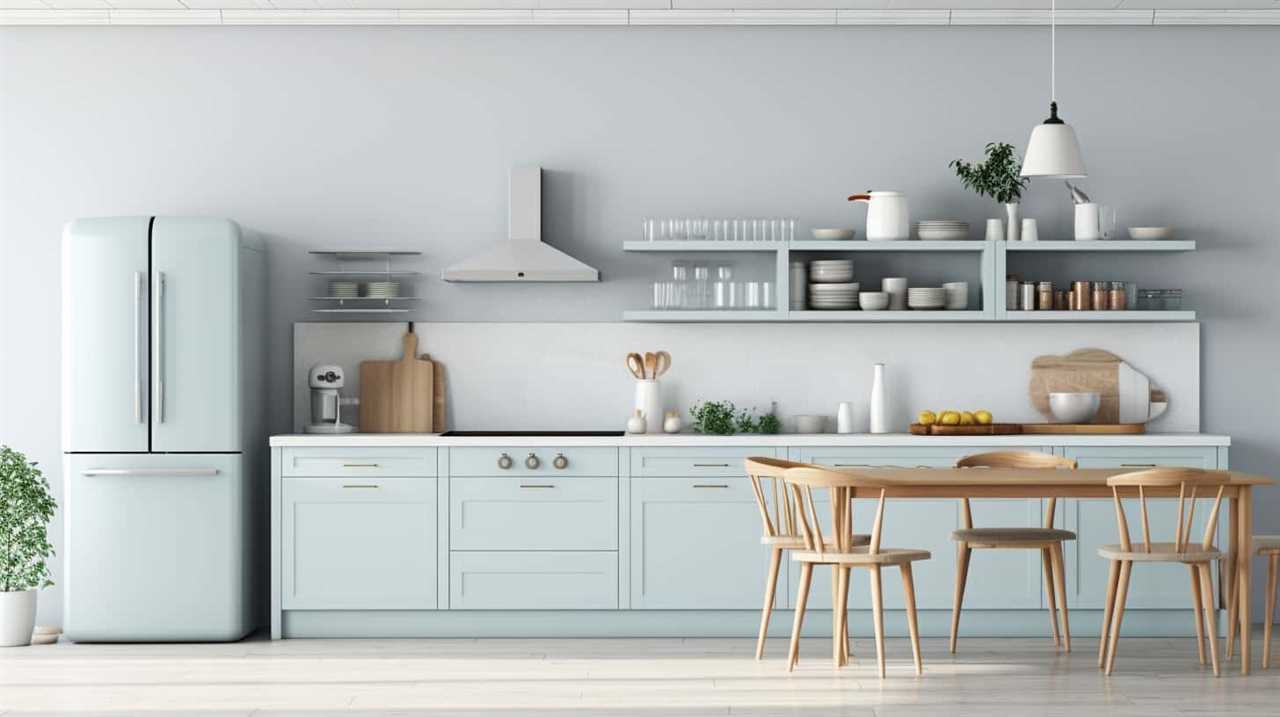
Upgrading your old appliances to newer, more energy-efficient models can lead to significant energy savings over time. New appliances are designed with advanced technology that consumes less electricity while providing the same or even better performance.
On the other hand, repairing old appliances can be a more cost-effective option if the repairs are minor and the overall energy consumption isn’t significantly affected. It’s essential to weigh the cost of repairs against the potential energy savings from upgrading.
Additionally, energy-saving tips such as using power strips, adjusting temperature settings, and cleaning appliance filters can also help reduce electricity usage for old appliances.
Ultimately, the decision between upgrading and repairing should be based on a comprehensive cost analysis considering both short-term and long-term savings.
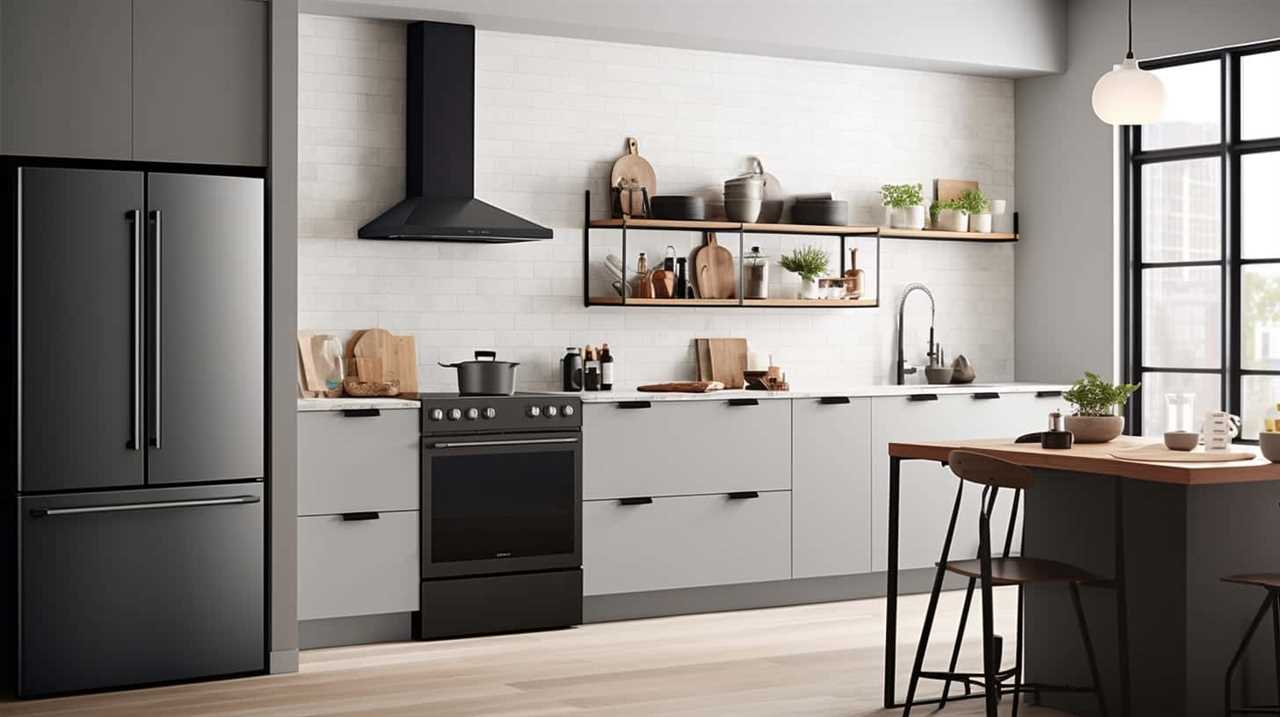
Taking Steps Towards Energy Conservation at Home
Continuing our exploration of cost-effective options for old appliances, let’s delve into how we can take steps towards energy conservation at home.
By implementing these energy-saving tips, we can significantly reduce electricity usage and lower our utility bills:
- Upgrade to energy-efficient appliances: Investing in appliances with high Energy Star ratings can save substantial amounts of electricity in the long run.
- Optimize thermostat settings: Adjusting the temperature by a few degrees can result in significant energy savings.
- Unplug unused electronics: Many devices consume energy even when not in use, so unplugging them can prevent unnecessary electricity usage.
Implementing these energy-saving measures not only reduces our environmental impact but also provides long-term financial benefits. By being mindful of our electricity consumption, we can contribute to a sustainable future while enjoying the comforts of our homes.
Frequently Asked Questions
Can I Reduce the Energy Usage of Old Appliances by Using Them Less Frequently?
Yes, we can reduce the energy usage of old appliances by using them less frequently. This is one of the energy saving tips that can help us reduce overall energy consumption in our homes.

Are There Any Government Incentives or Programs Available for Upgrading Old Appliances to More Energy-Efficient Models?
There are government incentives and programs available for upgrading to energy-efficient models. By taking advantage of these, we can save on electricity costs while enjoying the benefits of modern appliances.
How Can I Determine the Power Consumption of My Old Appliances Without an Energy Monitor?
To determine the power consumption of our old appliances without an energy monitor, we can calculate energy costs by multiplying the wattage of each appliance by the number of hours it is in use.
Are There Any Specific Maintenance Tasks I Can Perform to Improve the Energy Efficiency of My Old Appliances?
To improve the energy efficiency of old appliances, we can perform specific maintenance tasks such as improving insulation and adjusting temperature settings. These actions can help reduce electricity usage and increase overall efficiency.
Is It Worth Investing in Energy-Saving Accessories or Technologies for Old Appliances?
Investing in energy-saving accessories for old appliances can potentially reduce electricity usage and save money. Without these accessories, there are risks of higher energy consumption. Cost-effective alternatives to upgrading appliances include proper maintenance and using power-saving features.
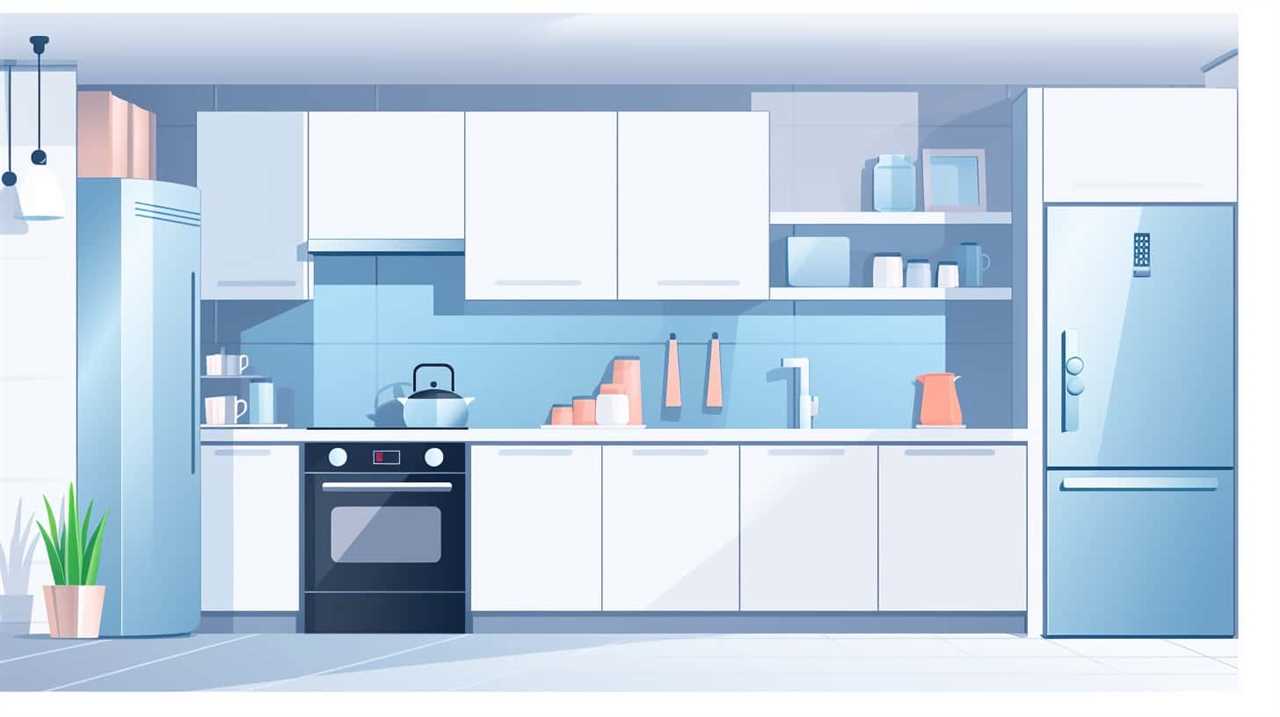
Conclusion
In conclusion, when it comes to old appliances, it’s clear that they tend to use more electricity compared to newer models. This is due to factors such as outdated technology, lack of energy efficiency ratings, and wear and tear over time.
Upgrading to newer, more energy-efficient appliances can significantly reduce electricity consumption and save money in the long run.
It’s time to leave behind the old and embrace the new, as they say, ‘out with the old, in with the new.’
